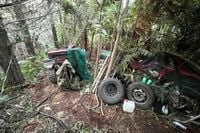In the lush, remote forests of New Zealand’s North Island, a years-long saga of disappearance, survival, and tragedy has finally come to a close. On Monday, September 8, 2025, Tom Phillips—a fugitive father who had been missing with his three children since late 2021—was shot and killed by police after a dramatic confrontation in the rural Waikato district. The incident, which left one police officer critically injured, has captivated the nation and raised troubling questions about how a family could vanish so completely in modern times.
According to police officials cited by Global News and the Associated Press, the final chapter began in the early hours of Monday morning. Police responded to a break-in at an agricultural supplies store in Waitomo, a small town in the sprawling farming region of Waikato. Phillips, accompanied by one of his children, was attempting to flee the scene when he was stopped by an officer. What happened next was both swift and violent: the officer was shot multiple times at close range with a high-powered rifle. Despite the severity of his injuries, authorities later confirmed the officer was undergoing surgery and was expected to survive, though a long recovery lay ahead.
More officers soon arrived, and in the ensuing chaos, Phillips was fatally shot. The child with him was taken into custody and, in a surprising turn, cooperated with authorities. This cooperation proved vital—within hours, police were able to locate the other two children, who were found alone at a makeshift campsite deep in the rugged forest. The children, now aged 9, 10, and 12, had spent nearly four years living a life far removed from society, without access to formal education or healthcare.
Police Commissioner Richard Chambers, speaking to reporters on Tuesday, described the family’s hidden campsite as a temporary one, littered with soda cans, tires, a metal container, and an array of camouflaged belongings. "It’s highly likely that we’ve been very, very close—if not right there," Chambers remarked, noting that the area had been previously searched. The site also contained firearms, a chilling reminder of the dangers that had shadowed the search from the start.
The mystery of how Phillips and his children managed to evade discovery for so long is now the focus of a renewed police investigation. Chambers acknowledged that Phillips, a skilled outdoorsman, likely had help from others. "Officers would seek to uncover the identities of anybody who may have been helping Mr. Phillips," he said, according to the Associated Press. Despite a reward of 80,000 New Zealand dollars (about US$47,000) being offered for information, no one came forward to reveal the family’s whereabouts.
The case has sharply divided public opinion in New Zealand, especially among residents of Marokopa, the tiny rural settlement where Phillips once lived. Some locals, and even online supporters, expressed sympathy for Phillips and his actions. Yet Commissioner Chambers was unequivocal: "I can tell you he is no hero. No one who does this to children, no one who unleashes high-powered rifles on my staff, is a hero, simple as that."
This was not the first time Phillips and his children had disappeared. In September 2021, the family vanished after Phillips’ truck was found abandoned on a wild beach near their home, sparking a massive land and sea search. Authorities initially feared the worst, believing the family might have been swept out to sea. But after 17 days, Phillips and the children reemerged from the forest, claiming they had been camping. He was charged with wasting police resources and was due in court in January 2022, but vanished again with the children just weeks before the court date. Police did not immediately launch another search, as Phillips had told others he was taking the children on a camping trip.
After their disappearance in December 2021, the family became the subject of sporadic sightings—often captured on surveillance footage during alleged crimes in the area. Phillips was wanted for an armed bank robbery in May 2023, during which he reportedly shot at a member of the public while accompanied by one of his children. He was also spotted on CCTV committing other break-ins to steal supplies, with the most recent incident occurring just weeks before his death.
The children’s welfare during their years in hiding remains a subject of intense concern. Authorities confirmed that they had not attended school or seen a doctor since disappearing. Details about their current condition are closely guarded; child protective services are now involved, and a High Court judge has issued a temporary injunction barring the release of certain information. New Zealand’s Police Minister Mark Mitchell told reporters, "There’s a careful plan with everyone becoming involved at the right time in terms of making sure that they’re put on a really strong and healthy pathway to recovery." He added, "They have seen and been exposed to things that children in our country should not be. It’s very complicated and it’s very complex and it has been for quite some time."
The children’s mother, identified only as Cat by New Zealand media, expressed a mix of relief and sorrow in a statement to Radio New Zealand. "They have been dearly missed every day for nearly four years, and we are looking forward to welcoming them home with love and care," she said. "At the same time, we are saddened by how events unfolded today. Our hope has always been that the children could be returned in a peaceful and safe way for everyone involved." Cat’s words echoed the sentiments of many New Zealanders who had watched the story unfold with a mix of fascination and dread.
As investigators piece together how Phillips and his children survived in the wild for so long—enduring freezing winters, foraging for food, and avoiding detection—the case remains a sobering reminder of the limits of even the most coordinated search efforts. It also raises uncomfortable questions about the support systems available for families in crisis, and how quickly a domestic dispute can spiral into a national emergency.
For now, the children’s ordeal is over, but the reverberations of their years in hiding—and the violent end to their father’s flight—will be felt in New Zealand for a long time to come.



